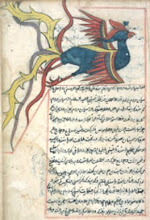There was, back in December of last year, about the time I was lauding its crisp pages like an orphan at his first Christmas dinner, a debate opening up in POETRY regarding the merits of Ezra Pound's Cantos. A tired argument, you might say, and a tired old place to have it, but, well....I am blogging for much the same reason you are surfing.
In recent times I have gone back to Pound's Canto's to find out if I was correct in so thoroughly getting over my initial enthusiasm for them, or it.
So begins Clive James in his graffito of one of the great poetic exiles.
Fifty years ago, when the mad old amateur fascist was still alive and fulminating, I fell for the idea of his panscopic grab bag the way that I was then apt to fall for the idea of love.
Ah, dear old Clive, our very own Don Bradman of the reverse average, holding out until the maiden comes. Not so strange to your dear blogger, I suppose, as a man who so aspires, except that Clive seems to have fallen out of love with the mad visionary and in love with the ordinary when there has in fact been no surer, more steady time to do exactly the opposite.
Come let us pity those who are better off than we are.
Come, my friend, and remember
that the rich have butlers and no friends,
And we have friends and no butlers.
One of those closed conceits so loved of drawing rooms before the big guns made litter of the drawing rooms and many of the people in them. I will let go that clunky first line, the hokey indicative. I assume Clive James emulated the same clunky grammar in his passionate commentary on the flawed but passionate man for much the same reason.
I have been disappointed by most of my heroes one way or another, but that is the point of heroes, or at least the way we have been re-inventing them since the Wars.
There is in Pound's Cantos as much to confound and disappoint as there is in any chat between the triumphant and their tired and beleaguered ancestors.
Who, who will be the next man to entrust his girl to a friend?
Love interferes with fidelities;
The gods have brought shame on their relatives;
Each man wants the pomegranate for himself...
I am not of Clive Jame's generation, so I can only blog at one remove about the desolation they soaked in around the dinner table (yes, there used to be such things, dear reader, even in my over-extended blog-time), but there seems to have been an air of acquisition in the generation following the last war that is almost Hellenic in its breadth and scope
...just as we can scrutinize the aging remains of our bodies in the mirror and decide that these loose remnants would not even be here to be looked at if we had not been strong and healthy when we were young, so we can look back to when we were wrong, and decide whether we were wrong as all that.
Indeed.
Youth and health have their virtues, as Clive James so readily doffs to the Hellenic in his Antipodean heart, but play can take your eye out...
Tuesday, August 12, 2008
Subscribe to:
Post Comments (Atom)



No comments:
Post a Comment